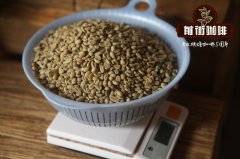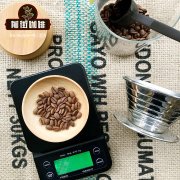Boutique Coffee | the course of boutique coffee in Ecuador

Coffee was introduced into Ecuador's Manabi province in the 1860s and became one of Ecuador's main exports in the 1950s and the second most valuable crop in Ecuador in the early 1980s. Ecuador produces Arabica coffee and Robusta coffee; the former is on the west coast and the south, while the latter is mainly in the north. The collapse in global prices in the 1990s and the Ecuadorian economic crisis in the early 2000s, coupled with a sharp decline in arable land and low production, meant a sharp decline in Ecuadorian coffee production.
One of the reasons for the low reputation of coffee quality in Ecuador is that 40% of the total coffee production is Robusta, and the quality of most Ecuadorian exported coffee is relatively low. To keep costs down, many coffees are dried on trees or in the courtyard before they are harvested, which is locally known as cafe en bola. This kind of coffee is usually used to make instant coffee, and 83% of the country's exported coffee is tanned.
Today, Ecuador is one of only 15 countries that produce both Arabica and Robusta coffee. In recent years, the restoration of old plantations and the replacement of old, low-yield trees have begun to restore production in the country. This growth has mainly affected Arabica coffee plantations and boutique coffee farms due to international demand for high-quality coffee. As a low-yield variety, Arabica coffee has a low caffeine content and is used in boutique coffee. By contrast, robusta coffee is high in production, caffeine, and is only used to mix espresso and instant coffee. Although Ecuador's popular Robusta coffee variety still dwarfs Arabica coffee in terms of production, it is actually the first time that the former has begun to decline.
In 2016, Tony Tony Querio of Spyhouse Coffee Company roasted a perfect Ecuadorian classic coffee at the American Baking Competition, which won the first prize. Arabica coffee bought by a South Korean company broke the country's previous price record at the 12th Golden Cup in 2018 in Quito, Ecuador. This is a sign that even though Ecuador's specialty coffee production is still small compared with its neighbors, the recent focus on quality is beginning to bear fruit.
Important Notice :
前街咖啡 FrontStreet Coffee has moved to new addredd:
FrontStreet Coffee Address: 315,Donghua East Road,GuangZhou
Tel:020 38364473
- Prev

coffee producing areas| Introduction to Sucu, Tipa District, Maravich| Malawi Chitipa Misuku
Malawi is a member of the East African Fine Coffee Association (EAFCA). It is located in southeastern Africa. It is a landlocked country without sea. It borders Tanzania in the north, Zambia in the west and Mozambique in the east across Lake Malawi (the third largest lake in Africa). It is one of the most stable African countries and one of the few African countries not affected by civil war. Malawi has a land area of 5.
- Next

The Rise of Yunnan Coffee| What is the future of Yunnan coffee?
In recent years, the development of Chinese specialty coffee has been rapid, and under the guidance of major mentors in Yunnan and other international CQI Q mentors, China has begun to implement Q plan. CQI partnered with Yunnan Coffee Exchange and other domestic partners as well as government projects in 2015 to help improve the quality of coffee and the lives of coffee producers. CQI and YCE have a wide range of projects, including specialty
Related
- Detailed explanation of Jadeite planting Land in Panamanian Jadeite Manor introduction to the grading system of Jadeite competitive bidding, Red bid, Green bid and Rose Summer
- Story of Coffee planting in Brenka region of Costa Rica Stonehenge Manor anaerobic heavy honey treatment of flavor mouth
- What's on the barrel of Blue Mountain Coffee beans?
- Can American coffee also pull flowers? How to use hot American style to pull out a good-looking pattern?
- Can you make a cold extract with coffee beans? What is the right proportion for cold-extracted coffee formula?
- Indonesian PWN Gold Mandrine Coffee Origin Features Flavor How to Chong? Mandolin coffee is American.
- A brief introduction to the flavor characteristics of Brazilian yellow bourbon coffee beans
- What is the effect of different water quality on the flavor of cold-extracted coffee? What kind of water is best for brewing coffee?
- Why do you think of Rose Summer whenever you mention Panamanian coffee?
- Introduction to the characteristics of authentic blue mountain coffee bean producing areas? What is the CIB Coffee Authority in Jamaica?

